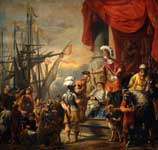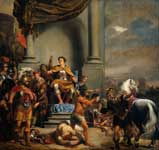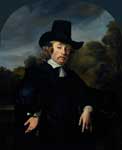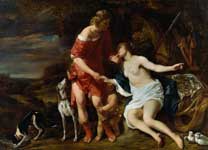Ferdinand Bol
Paintings
Venus and Cupid
An Astronomer
A Lady with a Fan
Venus and Adonis
Margarita Trip as Minerva, Instructing her Sister Anna Maria Trip
The Angel appearing to Elijah
Aeneas Receiving a New Set of Armour from Venus
Portrait of a Boy said to be the Artist's Son aged 8
Consul Titus Manlius Torquatus Orders the Beheading of his Son
A Lady Playing the Lute
Portrait of a young girl holding a posy of flowers and a young boy in a landscape
Self-portrait

Jacob's Dream of the sky ladder


Aeneas at the Court of Latinus

Consul Titus Manlius Torquatus Beheading His Son


Drawings
Saint Jerome in the Cave
The Sacrifice of Gideon
The Woman with the Pear
The Astrologer


Fine Art Prints | Greeting Cards | Phone Cases | Lifestyle | Face Masks | Men's , Women' Apparel | Home Decor | jigsaw puzzles | Notebooks | Tapestries | ...
Venus and Cupid
Ferdinand Bol (24 June 1616 – 24 August 1680) was a Dutch artist, etcher, and draftsman. Although his surviving work is rare, it displays Rembrandt's influence; like his master, Bol favored historical subjects, portraits, numerous self-portraits, and single figures in exotic finery.
The street Ferdinand Bolstraat in Amsterdam was named after Bol, just as the FEBO, which is a chain of Dutch walk-up restaurants. Ferdinand was born in Dordrecht as the son of a surgeon, Balthasar Bol. Ferdinand Bol was first an apprentice of Jacob Cuyp in his hometown and/or of Abraham Bloemaert in Utrecht. After 1630 he studied with Rembrandt, living in his house in Sint Antoniesbreestraat, then a fashionable street and area for painters, jewellers, architects, and many Flemish and Jewish immigrants. In 1641 Bol started his own studio.
In 1652 he became a burgher of Amsterdam, and in 1653 he married Elisabeth Dell, whose father held positions with the Admiralty of Amsterdam and the wine merchants' guild, both institutions that later gave commissions to the artist. Within a few years (1655) he became the head of the guild and received orders to deliver two chimney pieces for rooms in the new town hall designed by Jacob van Campen, and four more for the Admiralty of Amsterdam.
Around this time, Bol was a popular and successful painter. His palette had lightened, his figures possessed greater elegance, and by the middle of the decade he was receiving more official commissions than any other artist in Amsterdam.[4] Godfrey Kneller was his pupil.[5] Bol delivered four paintings for the two mansions of the brothers Trip, originally also from Dordrecht.[6]
Bol's first wife died in 1660. In 1669 Bol married for the second time to Anna van Erckel, widow of the treasurer of the Admiralty, and apparently retired from painting at that point in his life.[7] In 1672 the couple moved to Keizersgracht 672, then a newly designed part of the city, and now the Museum Van Loon. Bol served as a governor in a Home for Lepers. Bol died a few weeks after his wife, on Herengracht, where his son, a lawyer, lived.
Probably his best known painting is a portrait of Elisabeth Bas, the wife of the naval officer Joachim Swartenhondt and an innkeeper near the Dam square. This and many other of his paintings would in the 19th century be falsely attributed to Rembrandt.
Notes
Ferdinand Bol biography, Getty Museum
Twenty years later visiting Ferdinand, Balthasar was painted by Rembrandt.
Immediate neighbors included Hendrick van Uylenburg, who rented from Nicolaes Eliasz. Pickenoy, and Govert Flinck. Pieter Lastman and David Vinckboons lived across the bridge.
Biography, Getty Museum
Blankert, A. (1976) Ferdinand Bol.
Schwartz, G. (1984) Rembrandt, zijn leven, zijn schilderijen, (= his life, his paintings) p. 206.
Crenshaw, P. (2006) Rembrandt's Bankruptcy. The artist, his patrons and the art market in seventeenth-century Netherlands, p. 40.
----
Fine Art Prints | Greeting Cards | Phone Cases | Lifestyle | Face Masks | Men's , Women' Apparel | Home Decor | jigsaw puzzles | Notebooks | Tapestries | ...
----
Artist
A - B - C - D - E - F - G - H - I - J - K - L - M -
N - O - P - Q - R - S - T - U - V - W - X - Y - Z
Retrieved from "http://en.wikipedia.org/"
All text is available under the terms of the GNU Free Documentation License



















